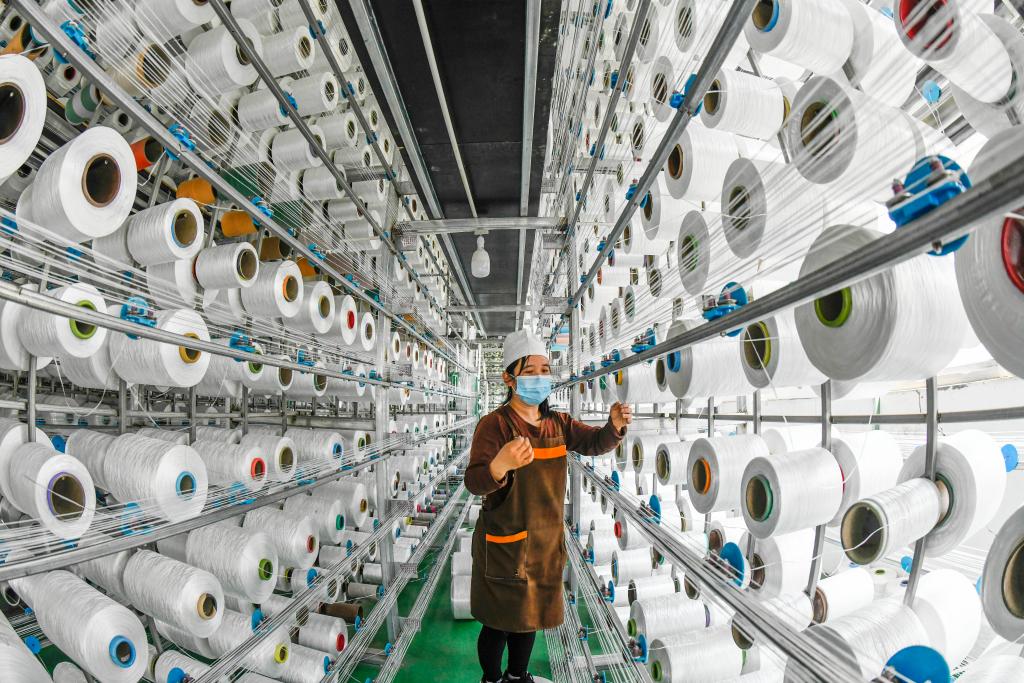
An employee works at a workshop of a textile enterprise in Zunhua City, north China's Hebei Province, April 16, 2025. (Photo by Liu Mancang/Xinhua)
While braving headwinds, textile industrial players in China are continuing with reforms in production models, technology innovation and marketing that help tide them through challenges.
These entrepreneurs increasingly realized that taking the initiative in reforming for high-quality development is the best choice, whether in prosperity or adversity.
"The world is changing, and if you don't change, you'll be left behind," said Xiong Li, chairman of Foshan Cape of Good Hope Clothing Co., Ltd. in south China's Guangdong Province.
It is worth mentioning that Shein, a fast fashion cross-border e-commerce company, has deeply influenced the internal structure of the global textile industry chain with its pioneering "small order, quick response" production model.
"Collaborating with Shein has helped alleviate the decline in our company's orders. What we need to do now is to continuously enhance our production capabilities to adapt to this 'quick response' model," Xiong said.
Xiong's remarks came against the background that the international situation is constraining, and domestic production capacity is declining, posing severe challenges to China's textile industry.
Many textile enterprises, under the pressure of international circumstances, are increasingly investing in research and development of new materials and are actively moving toward the high end of the international industrial chain. Many entrepreneurs have also expressed that the era of low-end competition is outdated, and future development lies in originality, branding and technology.
"Since 2017, we have felt uncertainties of the foreign market, prompting us to shift towards the domestic market. This transformation is very challenging. Without progress, there can be no future," said Pang Runwo, chairman of Foshan Xiangweirun Textile Co., Ltd.
Pang is planning to create a comprehensive production line that spans knitting, dyeing, apparel and branding, noting that "we must focus on supporting the industrial chain and innovation, which needs generations of relentless efforts."
Zhang Yinfang, general manager of Foshan Ruien Clothing Co., Ltd., noted that the company's transformation has been successful, and it has become a core supplier for Li-Ning, a leading Chinese athletic apparel and footwear brand.
"We used to be an export-oriented enterprise heavily reliant on foreign orders, which once accounted for 80 percent of our business. Now, that share has dropped to around 10 percent," said Zhang.
Experts analyze that although international market volatility has intensified and domestic challenges persist, the textile industry, as a traditional sector, still possesses significant scale, broad market demand, and strong employment capacity. It maintains its role as an important pillar of the economy and people's livelihoods.
Enhancing risk resilience and achieving high-quality development in the industry is of great significance, experts added.
Zhang Jiangping, chairman of the Peacebird Group, one of China's most well-known apparel brands, said that from the perspective of enterprises, it is crucial to leverage brand leadership, actively embrace new business formats and channels, drive digital transformation, and accelerate upgrades in strategy, products, channels and marketing.
Zhang Weiwei, board secretary of Texpro Precision Technology (Guangdong) Co., Ltd., said that "apparel consumption represents a vast market. As long as we adapt to global shifts, we will always find viable paths."
Meanwhile, insiders suggested that there is an urgent need to create a healthier development environment for enterprises and to combat rat-race irrational competition by focusing on the legal enforcement against false advertising, traffic hijacking, and commercial defamation.
An experienced entrepreneur in the textile industry noted that China has a complete self-sufficient production chain for textile machinery, auxiliaries, and products, which is unique globally.
"No matter what winds blow internationally, we firmly believe that China's textile industry will not falter," said Pang.
















